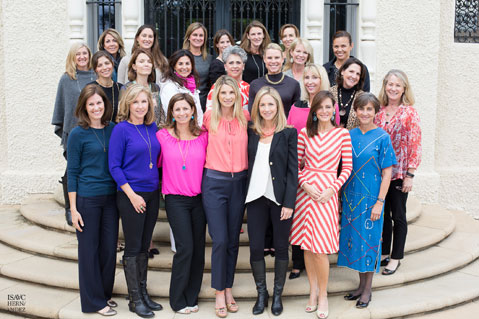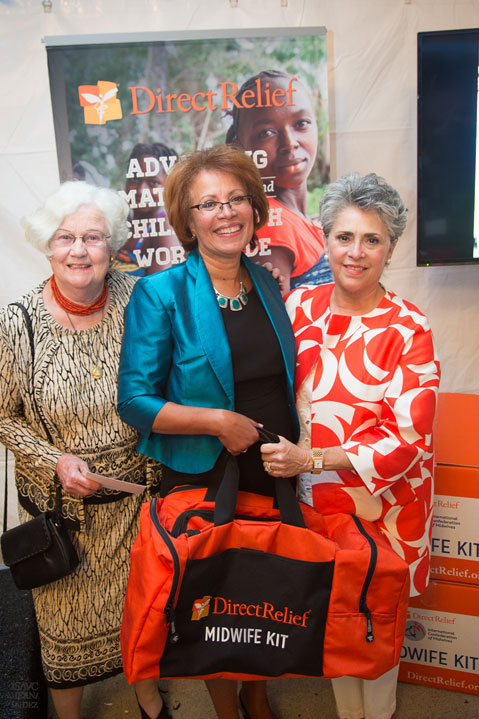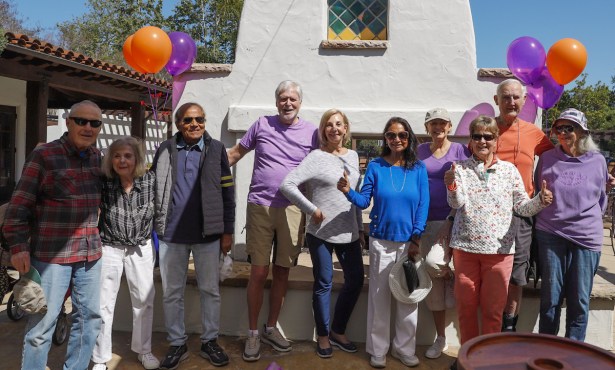Talking with the Midwife Expert
Frances Day-Stirk, of the International Confederation of Midwives, Headed Annual Direct Relief Fundraiser

Countries around the world need more midwives, Frances Day-Stirk told a 220-person crowd Thursday night. The group assembled for the evening to support Direct Relief at the nonprofit’s annual Mother’s Day fundraiser, from which the donations over the years have benefited the organization’s maternal and child health-care initiatives, including its midwife program. Thursday’s shindig brought in more than $100,000, all of which will go to those programs.
The night’s special guest was Day-Stirk, a Jamaican-born midwife who heads the International Confederation of Midwives, which represents 250,000 midwives across nearly 100 countries. This year, after two years of collaboration, it offered its seal of approval to Direct Relief’s midwife kits. In the kits — sent to Sierra Leone, Liberia, the Philippines, and Somaliland, with help also to Direct Relief’s partners in Nepal — are 59 essentials for midwives to help provide 50 safe births: hemorrhage-prevention drugs, drugs for eclampsia, surgical tools, sutures, and headlamps, among other items.

Ahead of her fundraiser remarks, Day-Stirk chatted with The Santa Barbara Independent about why she chose this profession and why others should consider doing so, too.
First of all, what exactly is a midwife?
A midwife is a qualified health-care professional whose remit includes the care of childbearing woman and newborn. Midwives are primary care, public health practitioners who work collaboratively with other health professionals, e.g., ob/gyns and neonatologists, nurses etc. We have a wide remit and range of responsibilities within reproductive, maternal, and newborn health.
Are there misconceptions around the job?
There are several misconceptions, depending on where you live in the world. In countries with a well-established midwifery profession, e.g., Sweden, Denmark, Netherlands, New Zealand, and the U.K., the role is clearly understood. In countries without this history, some believe that midwives are untrained or unskilled, being unaware of the definition of a midwife and the education, competencies involved, and the requirement to be licensed to practice. Or that midwives have to be nurses first. Or that we just “catch babies.”
What do you enjoy most about your job?
I really feel privileged to have been a midwife for over 30 years, and being the leader of the global organization of midwives is an immense honor. I enjoy being able to share information and evidence about the difference that educated, regulated midwives can make to women and their babies. Meeting midwives in countries all around the world and learning about their practices and how they are able to build associations and engage with women and decision makers is wonderful.
Where are midwives most needed or wanted?
The world has a deficit of 350,000 midwives. The greatest need is in 73 of the 75 low- and middle-income countries (mostly African, Asian, and Latin-American countries). There, 96 percent of the world’s maternal mortality, 91 percent of the world’s stillbirths, and 93 percent of all the world’s newborn deaths occur. These countries produce 78 percent of the world’s births with less than 42 percent of the world’s midwives, nurses, and physicians.
Why did you want to become a midwife?
I did not plan to become a midwife. Originally from Jamaica, I went to England to study nursing and was advised to do as many post-graduate courses as possible, including pediatric nursing and midwifery before returning. Once I undertook the midwifery program, that was it. I was hooked and made that my career. I loved being with women, supporting them and their partners through pregnancy and labor, and all that newborn care and becoming a family involves.
Tell me about your role for the International Confederation of Midwives (ICM)?
As president, having been re-elected in 2014 for a second and final term, I am responsible for leadership of the organization, together with the members of the ICM board, for its governance, development, viability, and achieving its mission. I represent the ICM with various UN agencies and with other health-care professional organizations. I enjoy visiting countries and meeting with Midwife Association leaders, midwives, politicians, and decision makers to promote education and regulation of midwives, which leads to quality care for women and babies.
What are some interesting stats you can share?
California has the highest number of midwife-attended births in the U.S. In 2013, according to the Centers for Disease Control, there were approximately 43,000 certified nurse-midwife-attended (CNM) births in California. Other types of midwives attended approximately 2,000 births for a total of 45,000 midwife-attended births in California. Of the CNM-attended births, approximately 97 percent occurred in a hospital. The rest were in a birth center or residence. Among those attended by other midwives, 82 percent occurred in a residence, 8 percent occurred in a hospital, and 5 percent in a birth center.
Unfortunately, California is actually one of only five states left in the United States that require midwives to be supervised by physicians. (The other states are Nebraska, Virginia, North Carolina, South Carolina, and Florida.) Clearly, physician supervision is out of step with modern U.S. standards of practice as well as global standards. The American College of Nurse-Midwives is working diligently in physician-supervision states to enable CNMs to practice to the full extent of their education and training. In fact, a legislative battle is underway in California to allow CNMs to practice to their full scope.



